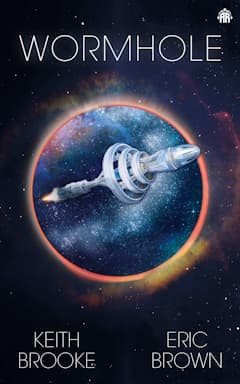
Wormhole by Keith Brooke and Eric Brown
(Angry Robot, 2023)
Reviewed by Ben Jeapes
Tragically, this is presumably the last original piece of work by Eric Brown that will be reviewed, the author having died in March. Keith Brooke thankfully is still with us. Both excellent writers in their own right, they blazed their reputations with a series of collaborations, and here they are together with their only one-off long-form collaboration.
Eighty years ago, the European slower-than-light starship Strasbourg set off for Carrasco, an Earth-type planet orbiting the star Mu Arae, with the crew in suspended animation. Soon after launch it exploded with the loss of all hands.
Except that now it appears that not only did Strasbourg not explode but it was carrying the terminus for a wormhole that now allows instantaneous travel across the 50 light year gap between worlds.
Which is not the only surprise for Inspector Gordon Kemp, a formerly high flying, recently demoted London detective at the end of his career and prospects. Shortly before the ship’s departure there was a murder here on Earth. The victim’s wife Rima was a prime suspect, but a cast iron alibi meant she was still allowed on the voyage. Now evidence has emerged casting doubt on her alibi. Kemp is to go through the wormhole to Carrasco and bring her back for investigation.
Of course, it’s not that simple, as first Rima on Carrasco, and then Kemp back on Earth separately start to find out. The two points of view enable two distinct but converging settings for the story, an interesting mix of future tech noir police work on Earth and all the unknowns of a new colony planet. Double the speculation!
Carrasco is suitably alien in appearance and description—a nice touch is that it stinks due to quantities of methane, sulphur and hydrogen sulphide in the atmosphere. The authors are obviously aware that in this post-Avatar age you can't get away with planets that could just be filmed on location. Sadly, the ineptitude of the colony leaders and the background politics that drive the plot show that whatever policy makers are reading in 170 years’ time it won't be early 21st century science fiction—and they probably won’t have watched Avatar either.
It becomes clear that Kemp has been selected for this mission due to his expendability—but why would that matter? Like all good detective stories there are escalating levels of mystery. At first so clear cut, the case ravels before Kemp’s eyes as the plot lines start to feed off each other. What was the actual purpose of Strasbourg’s mission? Why was no one told about the wormhole terminus? Why were the populace allowed to believe Strasbourg had exploded enroute?
Britain appears to be back in the EU, but that is the only utopian aspect of this eco-catastrophised, China dominated, tech noir future. The plot and setting convince but sadly I have to say the writing could have been tighter. Kemp is just a little stereotyped as the good cop working for bad bosses, and I never did understand why Strasbourg appeared to explode or why its survival was hushed up; part of the overarching big game, or an actual glitch that comes to serve no plot purpose? The authors seem to be just a bit too fond of their main characters—they suffer, but not always terminally—and the ending feels rushed. A development right at the end that could have just kept cranking up the tension until the last page is just revealed in a couple of lines of dialogue as part of a slow glide down to a happy ending. But still, it’s a worthy memorial for Eric Brown (as if his existing corpus wasn’t already) and I do hope he left plenty of notes with Keith Brooke so that his co-author can carry on exploring this future.
Review from BSFA Review 21 - Download your copy here.
